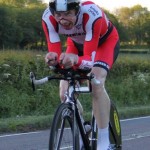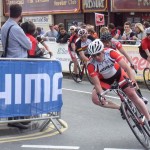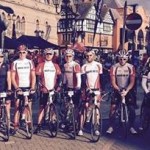Road Racing
“Road racing is the oldest form of cycle sport, dating back to the very beginnings of the bike.
Today its combination of a long, rich heritage, high speed, hi-tech and a great social scene make it one of cycling’s most enduring disciplines. From time trialling to stage racing, there’s a type of road racing to suit everyone.” British Cycling
Time Trailing is an ideal introduction to competitive bike racing.
A time trial tests a rider not against other cyclists but the watch. There are Individual and Team Trials
In and Individual Time Trial (ITT) competitors race individually, starting at intervals of a minute or more. Riders may not ride together and if one rider catches another must not “draft” to gain an aerodynamic advantage
The order of start is often organised so that the fastest riders are spaced apart. In that way they are less likely to catch each other while, when they may catch slower riders, they will pass that much faster that neither will be helped nor hindered.
UK races can be organised over any distance but in practice they are most often run at standard distances of 10, 25, 50 and 100 miles with occasional races at 30 miles. The winner is the fastest over the course
Specialist equipment is not required. Although there is competition for places, based on the shorted time over the course, the real race is against yourself: how have you done since the last event, how is your time compared to your nearest rivals. A standard road bike allows this, although serious Time Trailers spend a great deal of effort in achieving the best aerodynamic advantage that loses minimum power output
Team Time Trials (TTT) are run under the same basic principles, but the team rotates the lead and other team members draft the lead rider. Teams cannot draft other Teams.
TTT are often referred to by the number in the team, at its simplest this is the two rider team or the “2 up”
Success depends on pacing, knowing the effort you can make to be sure of not fading before he end of the race, but not finishing feeling you could have ridden harder, but that you have “left it all out on the road”
In the UK Time Trialling is governed by the Cycling Time Trials
A Criterium (or Crit) is a bike race of a specified number of laps on a closed course over public roads closed to normal traffic, usually in town centres or areas of a city. Sometimes they are run on cycle dedicated circuits, such as the Cycle Track at Sundorne
Race length can be determined by a number of laps or total time, in which case the number of remaining laps is calculated as the race progresses. Generally the race lasts for an hour.
Success in criteriums requires a mix of good technical skills and exceptional sprint ability to attack other riders and repeatedly accelerate hard from corners.
Kermesse
Kermesse are most commonly found in Belgium, Netherlands and Northern France. Like a Criterium, they are run on closed road circuits, but the individual laps are longer, usually taking a loop out into the surrounding countryside. Typically 10 to 20 laps, of between 5 and 10 kilometres. The race usually begins and ends in the centre of the town which is hosting the day’s race. The race will occupy the roads in town as well as the roads surrounding, either city streets or rural area. A Keremsse usually lasts about twice the time of a Criterium
Road Race
A Road Race is contested by individuals or Teams. They can be one day races or multiday races (Stage Races)
A one day race normally starts and finishes close to the same point, with a lap, or laps being ridden back to the start. This is good for spectators, support and officials, as well as making it easier for riders to get home. The distance of the race is predefined
The majority of traditional road racing takes place on the open road, with vehicular marshalls marking the nose and the tail of a race.
Races can either be stand-alone events of part of a league or series
Stage Races operate on similar grounds, but the route if often between places. Subsequent stages will start close the end of the previous stage.
The ultimate stage races are the Grand Tours (Giro d’Italia, Tour de France, Vuelta a Espane), but many more races are run (most commonly over 5 days
Sportives (as organizers are keen to point out) are not races. They are, however, often very competitive. The challenge if often against yourself as overall times and positions are often not published. They represent a challenging form of “social” riding, often in large groups over challenging terrain
Included in this category are charity events.
Riders are set off in groups and do not leave en-masse (for safety reasons). Few riders enter on their own these days and it is less likely that a natural group will form on the road, but when they do can be quite large. A good way to start to learn the skills of riding in larger groups of rides you are not familiar with. Ride protocol is to take a turn at the front on joining a group
To find a suitable sportive visit Cyclosport.org



